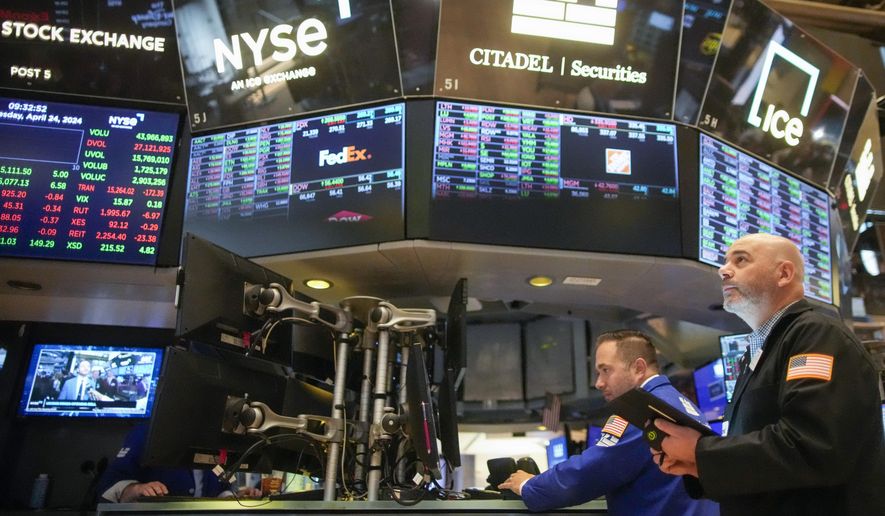NEW YORK — Worries about a potentially toxic cocktail combining stubbornly high inflation with a flagging economy dragged U.S. stocks lower on Thursday. A sharp drop for Facebook’s parent company, one of Wall Street’s most influential stocks, also hurt the market.
The S&P 500 fell 0.5% and sliced some of the gains off what had been a big winning week. It looked to be heading for a much worse loss in the morning, when it tumbled as much as 1.6%.
The Dow Jones Industrial Average dropped 375 points, or 1%, after earlier falling 700 points. The Nasdaq composite sank 0.6%.
Meta Platforms, the company behind Facebook and Instagram, dropped 10.6% even though it reported better profit for the latest quarter than analysts expected. Investors focused instead on the big investments in artificial intelligence Meta pledged to make. AI has created a frenzy on Wall Street, but Meta is increasing its spending when it also gave a forecasted range for upcoming revenue whose midpoint fell below analysts’ expectations.
Expectations had built high for Meta, along with the other “Magnificent Seven” stocks that drove most of the stock market’s returns last year. They need to hit a high bar to justify their high stock prices.
The entire U.S. stock market felt the pressure of another rise in Treasury yields following disappointing data on the U.S. economy. The report undercut a central hope that’s sent the S&P 500 to record after record this year: The economy can avoid a deep recession and support strong profits for companies, even if high inflation takes a while to get fully under control.
That’s what Wall Street calls a “soft landing” scenario, and expectations had grown recently for a “no landing” where the economy avoids a recession completely.
But Thursday’s report said the U.S. economy’s growth slowed to a 1.6% annual rate during the first three months of this year from 3.4% at the end of 2023.
That was weaker than expected and would have been disappointing by itself. Making it worse for financial markets, the report also said inflation was hotter during the three months than economists forecast. That could tie the hands of the Federal Reserve, which typically juices sluggish economies by cutting interest rates.
Thursday’s economic data will likely get revised a couple times as the U.S. government fine-tunes the numbers. But the lower-than-expected growth and higher-than-expected inflation is “a bit of a slap in the face to those hoping for a ‘no landing’ scenario,” said Brian Jacobsen, chief economist at Annex Wealth Management.
“Things can change a lot from one quarter to the next, so it’s too early to say the Fed has failed, but this doesn’t help their cause.”
Underneath the surface, the economic report may not have been as bad as initially thought. Much of the slowdown was due to a rise in imports and other factors that can swing sharply and quickly. The main engine of the economy, spending by U.S. households, remained relatively solid.
That helped blunt the worry caused by the report, helping markets to pare their morning losses, but it did not erase the threat.
Treasury yields still climbed as traders pared bets for cuts to rates this year by the Federal Reserve.
The yield on the 10-year Treasury rose to 4.70% from 4.66% just before the report and from 4.65% late Wednesday.
Traders are largely betting on the possibility of just one or maybe two cuts to interest rates this year by the Fed, if any, according to data from CME Group. They came into the year forecasting six or more. A string of reports this year showing inflation remaining hotter than forecast has crushed those expectations.
Top Fed officials have said they could hold its main interest rate for a while at its highest level since 2001. High rates slow the overall economy and hurt prices for investments, while cuts could help inflation reaccelerate.




Please read our comment policy before commenting.